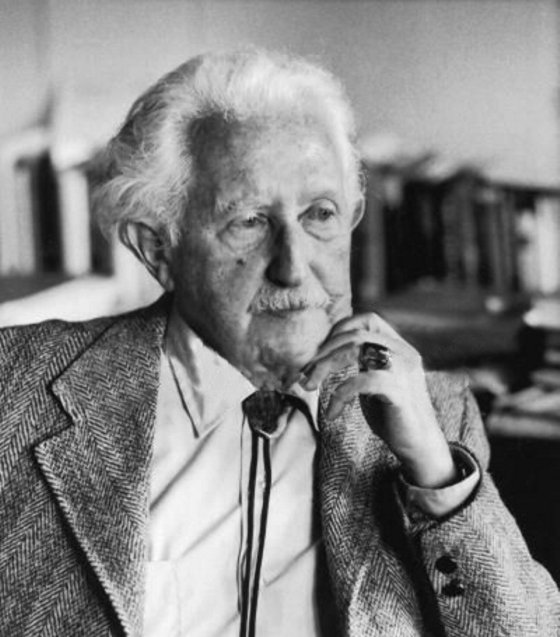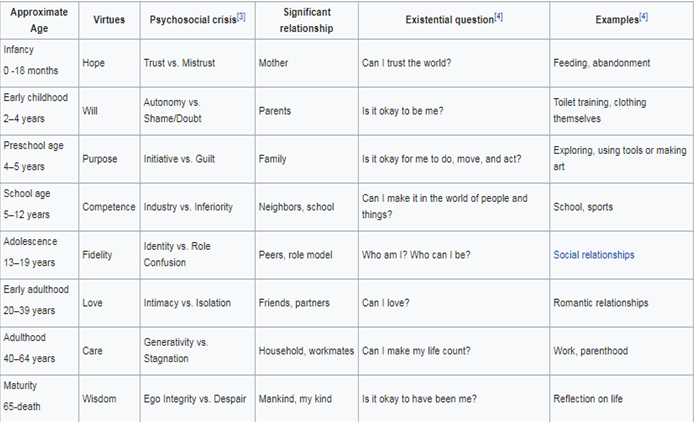Hello friends, in the following article we present a synthesis of Erik Erikson's Theory of Psychosocial Development, composed of eight stages. Each one of them gives rise to the development of a series of competences that, if acquired, help to resolve the goals that will be presented during the next life stage. The different stages are determined by a conflict that allows psychological growth. Among the basic concepts that are described are, The discrepancy between Erik Erikson and Sigmund Freud, the Characteristics of Erikson's Theory, in addition to the 8 psychosocial stages in the theory of psychosocial development. You are invited to read the article ... if you have not done it yet !.

The concept of psychosocial development refers basically to how the person's interaction with their environment is given by fundamental changes in their personality.
Erik Erikson
In Evolutionary Psychology, also called Development Psychology, Erikson's Theory of Psychosocial Development is one of the most widespread and accepted theories. Next, we will describe some of the foundations of Erik Erikson's theory, as well as describing the stages and their conflicts.
1. The theory of psychosocial development of Erikson
The Theory of Psychosocial Development was devised by Erik Erikson from the reinterpretation of the psychosexual stages developed by Sigmund Freud in which he emphasized the social aspects of each one of them in four main facets:
1 . He emphasized the understanding of the 'I' as an intense force, as an organizing capacity of the person, able to reconcile the syntonic and dystonic forces, as well as to solve the crises derived from the genetic, cultural and historical context of each person.
2 . He highlighted the stages of Freud's psychosexual development, integrating the social dimension and psychosocial development.
3 . He proposed the concept of personality development from childhood to old age.
4 . He investigated the impact of culture, society and history on the development of personality.
2 . The discrepancy between Erik Erikson and Sigmund Freud
Erikson disagrees with Freud on the relevance that the latter gave to sexual development to explain the evolutionary development of the individual.
Erikson understands that the individual, as he goes through the different stages, develops his consciousness thanks to social interaction.
3 . Characteristics of Erikson's theory
Erikson also proposes a theory of competence. Each of the stages of life leads to the development of a series of competences.
If in each of the new stages of life the person has achieved the competence corresponding to that vital moment, that person will experience a sense of mastery that Erikson conceptualizes as ego force. Having acquired competence helps solve the goals that will be presented during the next life stage.
Another of the fundamental features of Erikson's theory is that each of the stages are determined by a conflict that allows individual development. When the person manages to resolve each of the conflicts, it grows psychologically.
In the resolution of these conflicts the person finds a great potential for growth, but on the other hand we can also find great potential for failure if we can not overcome the conflict of that life stage.
4 . The 8 psychosocial stages
1 . Confidence vs. Distrust
This stage runs from birth to eighteen months of life, and depends on the relationship or bond that has been created with the mother.
The relationship with the mother will determine the future links that will be established with people throughout their lives. It is the feeling of trust, vulnerability, frustration, satisfaction, security ... that can determine the quality of relationships.
2 . Autonomy vs. Shame and doubt
This stage starts from 18 months to 3 years of child's life.
During this stage the child undertakes his cognitive and muscular development, when he begins to control and exercise the muscles that are related to the corporal excretions. This learning process can lead to moments of doubt and shame. Also, achievements in this stage trigger a sense of autonomy and feel like an independent body.
3 . Initiative vs Guilt
This stadium travels from 3 to 5 years old.
The child begins to develop very fast, both physically and intellectually. Growing interest in interacting with other children, testing their skills and abilities. Children are curious and positive to motivate them to develop creatively.
In case the parents react negatively to the children's questions or to their initiative, it is likely that they will feel guilty.
4 . Laboriousness vs. Inferiority
This stage occurs between 6-7 years until age 12.
The children show a genuine interest in the functioning of things and try to carry out many activities on their own, with their own effort and putting their knowledge and skills to use. For this reason, the positive stimulation that the school can offer at home or in the peer group is so important. The latter begins to acquire a transcendental relevance for them.
In the event that this is not well received or his failures motivate comparisons with others, the child may develop a sense of inferiority that will make him feel insecure in front of others.
5 . Identity Exploration vs. Identity Dissemination
This stage takes place during adolescence. At this stage, a question is asked insistently: who am I?
Adolescents begin to show more independence and to distance themselves from their parents. They prefer to spend more time with their friends and begin to think about the future and decide what they want to study, where to work, where to live, etc.
The exploration of your own possibilities occurs at this stage. They begin to shore up their own identity based on their lived experiences. This search will cause you to feel confused about your own identity on multiple occasions.
6 . Privacy versus Isolation
This stage comprises from 20 years to 40, approximately.
The way of relating to other people is modified, the individual begins to prioritize more intimate relationships that offer and require a reciprocal commitment, an intimacy that generates a sense of security, of company, of trust.
If this type of intimacy is avoided, one can be bordering on loneliness or isolation, a situation that can end in depression.
7 . Generativity against Stagnation
This stage takes place between 40 to 60 years.
It is a lapse of life in which the person spends his time with his family. The search for a balance between productivity and stagnation is prioritized; a productivity that is linked to the future, to the future of their own and of the next generations, is the search to feel needed by others, to be and to feel useful.
Stagnation is the question that the individual asks himself: what do I do here if it does not work? He feels stuck and can not channel his effort to offer something to his people or the world.
8 . Integrity of the I versus Despair
This stage occurs from the age of 60 until death.
It is a time when the individual stops being productive, or at least does not produce as much as he was capable of before. A stage in which life and way of life are totally altered, friends and family die, one has to face the duels caused by old age, both in one's own body and in that of others.
Stages

another theory of great importance
https://steemit.com/psychology/@joseferrer/the-theory-of-learning-by-jean-piaget
References
- Robert Mcg. Thomas Jr., "Joan Erikson Is Dead at 95; Shaped Thought on Life Cycles," New York Times obituary, August 8, 1997. Online at https://www.nytimes.com/1997/08/08/us/joan -erikson-is-dead-at-95-shaped-thought-on-life-cycles.html.
- Crain, William (2011). Theories of Development: Concepts and Applications (6th ed.). Upper Saddle River, NJ: Pearson Education, Inc.
- http://web.cortland.edu/andersmd/ERIK/welcome.HTML
- Macnow, Alexander Stone, ed. (2014). MCAT Behavioral Science Review. New York City: Kaplan Publishing. p. 220
http://www.muskingum.edu/~psych/psycweb/history/erikson.htm - Bee, Helen; Boyd, Denise (March 2009). The Developing Child (12th ed.). Boston, MA: Pearson.
Axia College Materials (2010)
Hello,
We have found similar content: https://psicologiaymente.net/desarrollo/teoria-del-desarrollo-psicosocial-erikson
Not indicating that the content you post including translations, spun, or re-written articles are not your original work could be seen as plagiarism.
These are some tips on how to share content and add value:
Repeated plagiarized posts are considered spam. Spam is discouraged by the community, and may result in action from the cheetah bot.
If you are actually the original author, please do reply to let us know!
Thank You.
More Info: Abuse Guide - 2017.
Nice post. :) I recommend you the theory of Jean Piget.
thank you friend for your comment, I thank you if you support me with your vote and if you want you can reesteem
Wow this is an amazing post!
I'm right now in the category 13 - 19 years and I'm indeed searching my identity. I was a long time not quite sure what my true values are.
thanks friend for your comment, if it is of your interest, you can help me spread this article, thank you ..
excellent post friends, great contribution to psychology
good post boy greetings
Excellent post friend of mine .. Greetings and many successes .. I follow you very good content!
You got a 5.76% upvote from @postpromoter courtesy of @joseferrer! Want to promote your posts too? Check out the Steem Bot Tracker website for more info. If you would like to support development of @postpromoter and the bot tracker please vote for @yabapmatt for witness!
You got a 61.54% upvote from @nado.bot courtesy of @joseferrer!
Send at least 0.1 SBD to participate in bid and get upvote of 0%-100% with full voting power.
This post has received a 52.40 % upvote from @aksdwi thanks to: @joseferrer.